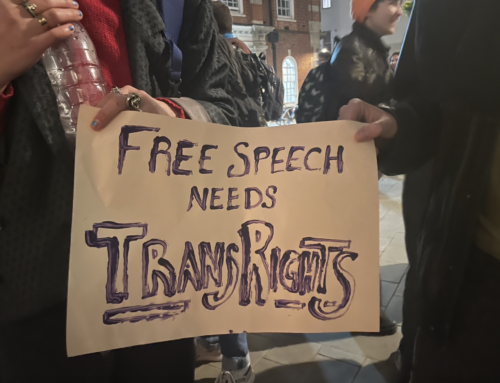Why leaving Stonewall is a con
Senior managers at the LSE and at UCL have unfortunately made the decision to leave Stonewall without understanding the broader context of either the current political climate for LGBTQ+ people, nor of the current political debate surrounding trans people and trans rights, which makes it hard to understand its impact. In this note, I would like to help correct that misunderstanding.
Let me first say something about the current context. Then I will turn to why leaving Stonewall is a con.
The climate for LGBTQ+ people today
There have been over 500 anti-LGBTQ+ laws proposed in America during the current 2023 legislative session, including Section 28 style prohibitions on children learning about sexuality and gender identity, which has recently spiralled in Tennessee into special prohibitions on “male or female impersonators” including gay and lesbian drag performers.
We were very aware of that when the LSE left Stonewall.
On the climate for trans people: there are large, well-funded right-wing American lobbying groups, which have for decades fought to roll back LGBTQ+ rights, and which have been increasingly funding transphobic media in the UK. Their aims include restricting trans people from accessing certain kinds of medical care, as well as refusing to afford trans people common respect like the ability to choose one’s name and pronouns, which we naturally afford to other members of society such as women and men who change their name for marriage.
Commitment to these restrictions were a central component of the recent Tory prime ministerial race, when Brexit wasn’t going well, and are central in the current Republican primary. The left-leaning Guardian has recently aligned itself with the UK right-wing regarding coverage of such trans issues, including censoring leading philosophers of gender who have written articles critical of UK transphobia.
We were very aware of that too when the LSE left Stonewall. That is our environment.
Suspicious connections to Stonewall discussions
Connections to that context are immediately recognisable to those who are directly affected by it. So, it was unfortunate to hear that some of the senior managerial comments in discussions about Stonewall have mirrored those talking points almost exactly. The former president of the LSE even used the phrase “the LGBTQ agenda” in a public Town Hall meeting, which has a sad history arising from anti-gay movements in America.
One would like to think that none of these managers intended to express homophobic or transphobic sentiments. But, not everyone is so innocent. A well-organised group of anti-trans campaigners at many universities have recently begun to target well-intentioned managers with liberal values, and who take words like “fear” and “free speech” and “bigotry” very seriously.
Their con is to use these words as a thin veil for policies that are exclusionary of people on the basis of a protected characteristic, being trans.
For example, prominent members of the LSE appeared in meetings of the Academic Board and at once claimed they are not transphobes, while at the same time stating in public forums that (I quote) “people who call themselves transsexuals” are “vectors of fear”. It is hard not to see the similarity to sentences like, “I am not a racist, but….”
A campaign of misinformation
These comments mirror a larger, more coordinated campaign to marginalise trans people. I have now been involved in dozens of discussions with university managers and members of the university community about LGBTQ+ policy. What became crystal clear is that a coordinated misinformation campaign is being executed by anti-trans lobbyists.
This misinformation is often avoiding detection, in part because of hubris—how could a university fall for a con?—and in part because of the secrecy with which these decisions are being made. The LSE fell prey to the con for exactly these reasons.
A first warning flag that the proposal to leave Stonewall is a con is how often it is suggested that basic respect for a tiny minority identity (trans people make up just 0.5% of the general population) poses a threat to the rights and free speech of a majority.
A second warning flag is how often it has been suggested that this same minority identity is responsible for an “environment of fear” amongst a majority.
A third warning flag is that the reasons being given for leaving Stonewall are virtually all have origins in anti-trans propaganda campaigns. I will go through these last examples in detail, so you can see where they all come from.
1. “Stonewall is against academic freedom?”
I have pointed out in detail in a memo how this excuse was a con. In a public Town Hall meeting, my interjection led interim-president Eric Neumayer to retract academic freedom as a reason to disaffiliate from Stonewall. The reason that “free speech” seems relevant to Stonewall is only because it is a falsehood that is constantly repeated by the anti-trans lobby.
Indeed, powerful anti-trans lobbyists from outside the LSE were openly pressuring LSE president Minouche Shafik to leave Stonewall just before she made her decision.
In reality, Stonewall has given an elaborate statement before Parliament about its commitment to academic freedom, and to the compatibility of this principle with respect for LGBTQ+ rights. Moreover, Stonewall’s advice in the Workplace Equality Index has always been purely advisory regarding things like mental health resources for our students, and has never even come close to bearing on academic issues like course content.
This is really the biggest con:
When you look closely, it is your pro-Stonewall staff and students are the ones advocating open discussion, including open discussions of hard questions like how inclusive our course guides are. In contrast, gender critical and anti-trans advocates are demanding restrictions on free speech to avoid such discussions, and to more generally to prohibit negative reactions to their exclusionary views.
In the face of such views, LGBTQ+ students and other staff will react negatively. This is not a violation of academic freedom. The great con is that gender critical ideology has managed to convince some that silencing their critics is a requirement of academic freedom, when quite the opposite is true.
2. “Stonewall is homophobic?”
This con requires a stretch of imagination. It is implausible from the outset, as Stonewall was founded in 1989 as a charity whose core mission includes the protection and promotion of homosexual rights.
The homophobia allegation is based on the false claim that Stonewall wishes to “erase sex or replace it with gender”, or that it “opposes same-sex attraction”, or even that it seeks to “pressure lesbians into having sex with trans men”. Stonewall has never proposed any of these things, and indeed makes essential use of sex in its advocacy for intersex people, including people with XXY and XYY chromosomes, who are rarely even mentioned in these debates. Stonewall’s data collection often focuses on both sex and same-sex attraction as well as gender.
However, Stonewall’s leadership has also publicly proposed that we all re-examine our prejudices, stating: “if, when dating, you are writing off entire groups like people of colour or trans people, it’s worth considering how societal prejudices may have shaped your attraction.”
The anti-trans lobby immediately accused Stonewall of demanding cis lesbians should be attracted to transwomen, without even considering the possibility that it might mean some cis lesbians could be attracted to transmen.
In the end, Stonewall’s remark doesn’t imply either: it was an invitation to re-examine prejudices. Prominent academics at the LSE may assert that an organisation is homophobic. But, when the context of those assertions is a large propaganda campaign, it is important not to jump to conclusions. Those claims have no basis in fact.
3. “Stonewall is sexist?”
This is similarly an enormous stretch. Commitment to women’s rights is a central part of Stonewall’s programmes and features centrally in its public statements to Parliament, as part of an intersectional feminist approach to advocating for LGBTQ+ people.
Modern intersectional feminist philosophy has identified no contradiction between feminism and trans rights, and most feminists view trans rights as an essential aspect of feminism. Only a small number of fringe philosophers argue otherwise, who are invariably experts in neither gender nor sex, although they are highly visible as pundits.
Stonewall has of course pointed out the fact that intersex people exist, in spite of the sophomoric punditry insisting that sex is “simply binary”. (For an accessible book on this, I highly recommend Sarah Richardson’s (2013) Sex Itself: The search for male and female in the human genome, University of Chicago Press.) This does not erase sex or women’s rights, but rather improves accuracy of the debate.
Stonewall has also pointed out that, unlike gender, people are generally terrible at correctly identifying a queer person’s sex on the basis of their appearance. This makes accurate policing of single-sex spaces impossible, and transphobic attempts to do so has led to an increase in harassment of not only transwomen but also cisgender women who do not fit gender norms, such as butch lesbians.
Stonewall’s observations about this are not incompatible with women’s rights, nor even with sex-based rights, but rather help one to avoid the unmitigated disaster that would arise from trying to police single-sex spaces.
4. “Stonewall is political, which is an unusual thing for a university to support?”
A common refrain from the anti-trans lobby is that the public discussion around trans people is a “toxic political debate”, especially when it comes to Stonewall. Part of their suggestion is that the debate is about “gender ideology”, similar to a debate about liberalism or libertarianism.
Although there is a political component, as in everything, trans rights are also a human rights debate, and Stonewall is a human rights charity. This is not just about beliefs, but about lived identity and experience.
Moreover, human rights organisations are political entities that universities have long supported, from the inclusion of women in higher education to supporting the end of South African apartheid. Leaving Stonewall thus sends a clear negative political message to the majority of the LGBTQ+ community, that the LSE views LGBTQ+ or trans rights as not among the human rights that a university should support.
5. “Stonewall offers poor/illegal advice to its participants?”
This is another con that hides behind legalese language, and which has been widely debunked. When pressed on this claim, the anti-trans lobby tends to give two examples.
The first is the fraught case of Allison Bailey. Most observers expected her firing due to disrespectful comments regarding her colleagues’ gender identity to be upheld, and were surprised when it was not. But, even given this, the UK Employment Tribunal found Stonewall was simply not responsible for the trouble caused to her in any way, in spite of the continued suggestions otherwise of the anti-trans lobby.
The second case is that of the University of Essex, where neither Stonewall nor the university’s lawyers noticed any problem with the choice to punish a teacher for remarks that were perceived as transphobic, but which in the highly dynamical legal environment around trans rights led to a lost legal case for the university. There was no advice from Stonewall whatsoever on this issue, but rather a lack of it, which unbiased observers have found entirely reasonable.
Perhaps more importantly: even if Stonewall had given advice, it would have been advisory and non-binding.
Senior managers at the LSE followed transphobic commentators in claiming in various public meetings that Stonewall gives “bad legal advice” on this basis. Unfortunately, such comments are themselves just repeating misinformation.
6. “The LGBTQ+ community is split?”
Anti-trans campaigners have gone to extraordinary lengths to point out a small number of gay and lesbian people who are anti-trans, including one of Stonewall’s founders, as an argument that the LGBTQ+ community is split over trans rights or Stonewall. Faux-advocacy groups have even been created under names like “The LGB Alliance”, but which do nothing to advocate for LG or B (Lesbian, Gay or Bisexual), and instead focus on promoting anti-trans legislation.
There are probably anti-trans people who are gay in your institution as well. There are in mine. But, “being gay” does not give one authority to speak for the entire LGBTQ+ community that Stonewall protects, and of course there are transphobes amongst every community.
Only a proper consultation can reveal what the majority of the community wants. And, both Stonewall and LGBTQ+ rights are extremely popular in the university. If you aren’t sure about that, just do a proper consultation.
At the LSE, the LGBTQ+ Steering Group was not properly consulted. The LGBTQ+ staff network Spectrum was not invited to consult its members. The unions were not consulted. The Academic Board was not consulted, and showed itself to have more Stonewall advocates than detractors. So, let us not talk about a “split community”, when it is only a loud but fringe minority who is against trans rights.
7. “Stonewall is low value for money?”
Gender critical advocates clearly have no idea how little Stonewall costs, nor how much it means to our community that we participate in it. The entire programme costs £2,500.
The LSE has already spent an order of magnitude more time and money trying to fill the vacuum left by Stonewall: hiring EDI staff, designing and executing an Action Plan, drawing on the good will of LGBTQ+ volunteers from Spectrum and around the School.
A much more efficient way to achieve their aims would have been to just enlist Europe’s largest LGBTQ+ charity to support them. For those of us who feel protected by Stonewall, this is an incredibly valuable exercise.
8. “Stonewall has a damaged reputation?”
Reputational damage by detractors is a common feature of virtually every civil rights movement in history. That includes Stonewall.
There is a well-funded propaganda campaign aiming to discredit Stonewall as part of a more general trans panic in the UK. This includes prominent left-leaning media outlets like the Guardian, who have recently aligned themselves with the British right-wing in their editorial choices surrounding trans rights and Stonewall, as a recent UCU report has shown.
Given the incredible amount of misinformation around Stonewall, it is no wonder that its reputation has been damaged. But, with the majority of the university and private sector institutions remaining committed to Stonewall, this is no reason for anyone to leave it.
How to proceed
Let me step back and characterise one of the groups that is lobbying the university management from a bird’s eye view. It consists in your trans supporters, including the vast majority of your LGBTQ+ community. These are people filled with wonder about the remarkable diversity of humans, who would like to ensure we all respect the names, pronouns and identities of our colleagues and students, and are asking for the protections, national benchmarks, and annual support of Europe’s largest LGBTQ+ charity, Stonewall.
Their ask from you is fundamentally about inclusion.
A second lobbying group consists of a small but vocal group of gender critical and anti-trans community members, who view feminism or homosexual rights as requiring the exclusion of trans people. They will ask you to Stonewall because they view it as part of an environment that is unwelcoming of their exclusionary beliefs about trans people.
Their ask is fundamentally about exclusion.
The first of these two requests is part of a noble aim for a university manager, to protect the remarkable diversity of its population by creating an inclusive environment. The second is not.
The policy-maker faced with this decision should begin by educating themselves. Don’t just listen to cisgender people like me: read or listen to the many, many examples of trans people commenting on this debate. That is perhaps the most essential in all of this, and it is one of the many things that the LSE management failed to do.
I wish you all the best in making the right choice.
This guest-post was communicated to us by LSE philosopher Bryan W Roberts.



